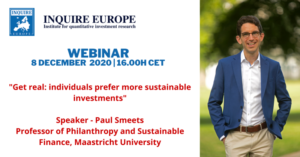
For those who were unable to attend, we compiled the key takeaways of the presentation given by Professor Paul Smeets.
The European government is increasingly taking sustainability into account across a number of sectors, including investing. “Due to the Action Plan of the European Commission, financial institutions will be required to ask retail investors about their sustainable investing preferences. That of course triggers the question: are individuals willing to ‘pay’ for sustainable investments?” said during his introduction to the webinar.
The professor then posed a set of questions to the audience. A majority of webinar participants believed that individuals should be asked about sustainability preferences by their pension fund managers. However, there was also a valid argument against it raised by a webinar participant: individuals do not have the proper amount of knowledge to influence these decisions. In other words, individuals may not be fully aware of what the financial consequences are to investing sustainably, and it is the fund managers who are ultimately responsible for a fund’s success.
“It is then reasonable to ask if sustainable investments would be prioritized only if the returns are comparable to normal investments,” said Smeets. The majority of those surveyed during the webinar responded indicating that losses would have to be accepted. One participant clarified the situation by saying, “you can’t have your cake and eat it too. Individuals will have to accept lower returns for the common good.”
“However, if the returns on sustainable investments are indeed lower than normal investments, they would be rejected by the neo-classical financial model,” says Smeets. In a previously published article by the professor, he researched the disparities in the behaviour of three different categories of actors based on what motivates them: the Arbitrageur (greed), the talker (reputational benefit), and the giver (positive contribution to society). Based on that study, Smeets discovered that only 10% of the participants were categorized as Arbitrageurs. The largest portion of investors were considered ‘givers’, which were discovered to be 2x more likely to buy sustainable investments even when faced with the reality that they must sacrifice money for the greater good of society.
Transitioning to the current piece of highlighted research, professor Smeets explained the basic parameters of his analysis. Members of the pension fund ‘Detailhandel’ in the Netherlands and were given the option to vote on whether the fund should increase its focus on sustainable investments. If 50% of the respondents were in favour of doing so, the fund committed to taking concrete action to fulfil their members’ demands.
Nearly 70% of the respondents voted to increase the fund’s focus on sustainable investing. Only 10% of the remaining respondents did not support an increase, and the remaining 20% had no opinion. When the asked if they should expect lower returns by investing sustainably, half of the respondents simply did not know and 4 out of 5 did not explicitly indicate that they believed it would come at a cost. This reinforces the point that was made earlier by a webinar participant: individuals are likely not sufficiently informed, and therefore may not have adequate knowledge to make decisions about asset allocation.
In June 2020, during the middle of the current Covid-19 pandemic, Smeets contacted the members of the pension fund again; this time it was to gauge whether they believed that the pandemic had adverse effects on their pension savings. Interestingly, over half of respondents believed that their benefits would be lower, while the other portion believed that it would be equal, or indicated that they simply did not know. For the majority, they maintained their unwavering commitment to sustainability. “For those who think that Covid-19 has a negative impact on their benefits, we still saw that a majority wanted the pension fund to invest in companies that score well on the Sustainable Development Goals,” said Smeets.
Interested in learning more about the research conclusions?
View a video recording of the webinar via: https://vimeo.com/488673207
